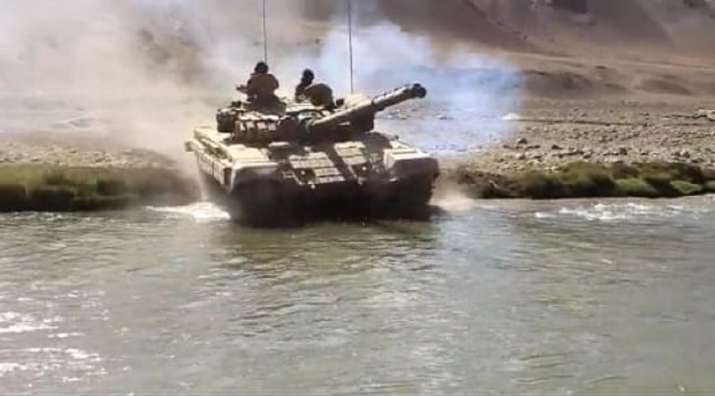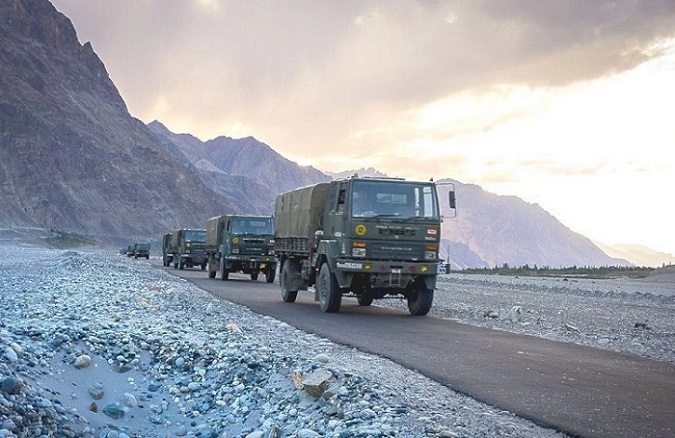With several retired defence officers commenting on the current standoff between the Indian Army and People’s Liberation Army (PLA) of China in Ladakh, there’s no dearth of views on how this issue should be resolved, both at the diplomatic and military levels. Veterans have gainfully drawn upon their intimate knowledge of the area as well as past experiences, and painstakingly correlated the same to the current situation. As a result, most have come out with articles that provide the reader with a holistic view of this seven-decade old problem along with a balanced assessment of the prevailing situation and some judicious recommendations on what the government needs to do.
The general consensus of the erudite veteran community, which is monitoring the standoff in Ladakh, is that even though the crisis is far from over, the situation is being handled well and that it’s yet too early to set the alarm bells ringing. However, there are a few who think otherwise and one of them is a former Army Commander, but then, contrarian views are always welcome as they make any discussion or debate all the more interesting. Furthermore, having been the General officer Commanding in Chief (GoC-in-C) Northern Command, even post-retirement, he carries the responsibility for weighing every word that he speaks or writes. There are musings on in the social media domain as to why was he moved out of Northern Command of the Army. It was at this point in time when he opposed this move tooth and nail. His efforts to question Indian Army and Govt of India are being seen from this lens of doubt over his integrity.
His piece titled “India’s Fingers have come under Chinese boots. Denial won’t help us,” (The Print, June 4, 2020), is very informative, but his premature conclusion that “China now has the upper hand in talks,” indicates the possibility of preconceived notions or anti-establishment prejudices influencing his rational thoughts. The ‘upper hands’ observation of his is based on the assumption that with PLA “Having seized the initiative by securing approximately 40-60 square km of Indian territory in three different areas, China will be negotiating from a position of strength and will try to impose unacceptable conditions–no further development of border infrastructure on the Indian side–to restore status quo on its own terms. ”
Furthermore, by adding that “…if diplomacy fails, China has come prepared for a border skirmish or a limited war,” he seems convinced that Beijing won’t back-off this time and if required, will even use force to get what it wants. Coming from a man who by virtue of previous knowledge, he may know Ladakh and PLA like the back of his hand, however it is not understood as to how he arrived at the precise prognosis of impending doom. Using the analysis with regards to terrain and sharing the strategy behind construction of certain roads and tracks amounts to violation of Official Secret Act. The General needs no explanation that veterans wear the rank post-retirement and are subject to Army Act for divulging any information that amounts to threat to National Security.
Whether or not China has really succeeded in “securing approximately 40-60 square km of Indian territory” can be seriously contested because it has been assumed that Chinese having come till Finger 4 means, LAC getting straightened 20 km to the North as well as South, thereby resulting loss of 40-60 square km. This assertion may not hold good, but when it comes from a former Army Commander, people tend to take it as a gospel of truth. This is no less than rumour mongering and propaganda because it is not backed up by truth. Moreover, when he makes the situation appear irretrievable without even awaiting Indian Army’s riposte, is to say the least, not only misleading but also something certainly not expected from a person of his standing and military experience. How could this former Army Commander ever forget that just within five years of the 1962 debacle, Indian Army (IA) gave a bloody nose to the Chinese in Nathu La? Even in the field of military diplomacy, the Indian Army proved its acumen by paying back the PLA in its own coin during the 2013 Daulat Beg Oldi (DBO) intrusion in Depsang Valley of Ladakh.

Let’s briefly recall the 2013 DBO (Daulat Beg Oldi) standoff, which occurred in an area claimed by both India and China. As part of confidence building measures (CBMs) both Indian Army and People’s Liberation Army (PLA) patrolled this area but didn’t establish any permanent posts here. However, in April 2013, a platoon of PLA set up a camp in Rakhi Nula and when they refused to withdraw, the Indian Army also established a camp just 300 metres away from the PLA camp. While this ‘eyeball-to-eyeball’ stalemate continued, in a proactive action that surprised the whole world, the Indian Army did a ‘Rakhi Nala’ on PLA by establishing its own camp in the Chumar sector, 500 km South of DBO (Daulat Beg Oldie). Unnerved by this move, China in a “quid pro quo”, agreed to abandon its camp near DBO in return for a similar action by India in Chumar.
The former Army Commander’s complaint that “… rather than evolving a clear strategy and broadly sharing it with the nation, the Narendra Modi government and the military have gone into ‘denial’ about any loss of territory, attributing the present situation to differing perceptions about the LAC” is surprising. How can a government which is in the thick of a territorial dispute with its neighbour disclose even its “broad strategy” by sharing it with the nation? In a subsequent piece titled ‘PM Modi’s silence on LAC stand-off is benefiting China. India must change its script’, (The Print, June, 11, 2020) he has been more specific by demanding that the “Modi government should take Parliament and the nation into confidence within the limits of security.” He also considers it “prudent for the Prime Minister to address the nation and military spokespersons to give formal briefings, at least once or twice a week.”
When the Home Minister has already given out the government’s strategy of using dialogue to resolve the issue and the army has quantitatively and qualitatively augmented its force level in the area (which is an unambiguous indication that while India is hoping for the best, it is at the same time prepared for the worst), what else is there to tell the nation? In addition, with External Affairs sources further clarifying that “This will be a long haul and small steps need to be taken to resolve the situation,” it’s absolutely clear that New Delhi is prepared to weather it out rather than look for an expedient and hasty face-saving exit. So, what more information on New Delhi’s strategy for handling this face-off is required to be told to us? Furthermore, when bullets aren’t flying and there’s no conflict on, what exactly do we want the military spokesperson to tell us during his weekly formal briefings? More so, minute-to-minute update is also likely to give out the patterns and modus operandi which is detrimental to operational security. It is advisable that no matter what his political orientation is post-retirement, no matter what personal interests he has chosen to serve and no matter what his personal beliefs are, he cannot act against the ethics of the organisation that made him what he is today.
So, since we have a lot of experience as far as incursions in Ladakh are concerned and know that these are long-drawn-out affairs, let’s not jump the gun by tilting windmills and start shouting from rooftops that ‘all’s lost’! The former Army Commander, who would have many who served under him or gained from his blessings has no reason to seek confidential information from them. This is no less that spying or subverting the serving individuals. The veteran General must grant that even those who are donning the uniform today and holding appointments as Commanders at different level are equally competent and have similar nationalistic fervour as his generation had had.
In fact, factoring in the advancements in Indian Army and the technologies prevalent, they are better informed, better trained and have better strategic perceptions. Once the curtain gets raised, he is sure to face serious embarrassments but by then he would have done damages not behoved from a person whom Army and the nation gave so much. If one analyses his personal and professional history while he was in service, lot of dark spots would emerge. There can be lots of questions against how he handled different facets of Northern or Central Command, what were the strategic contributions made by him or what conditions were created by him to strengthen the positions on Eastern or Western fronts. He is known to have spent more time measuring the size of the eggs. All those follies can be left for the future to analyse.
Tailpiece: The former Army Commander is of the view that “In the current crisis, the Modi government and the military have lost credibility and the battle of perception, and have literally endorsed China’s stand.” While I have no comments on this remark as far as the government is concerned, but as a veteran, the very thought of a former Lt. Gen. questioning the credibility of the very army he served in, is extremely distressing! The information that he carries with him was shared in his capacity as Army Commander and he has to exhibit responsibility towards preserving and protecting it. Personal preferences apart, we all are expected to stand above the bottom lines of morals and ethics and to set right examples for future generations of the Armed Forces.

